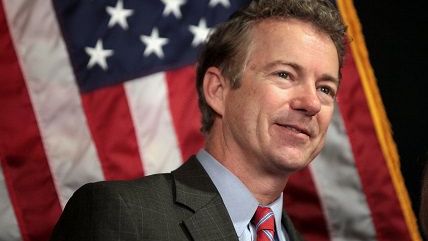Do We Really Want A Passive Judiciary? No.
The Constitution promises uncompromising protection of liberty.

Senator Rand Paul's recent remarks about "judicial restraint" have shaken up both left and right, but anyone who has stood before a judge or jury knows he's talking sense. "We say we don't want judges writing laws," Paul told an audience at the Heritage Foundation. "I don't want them writing laws either, but do I want judges to protect my freedom, do I want judges to take an activist role in preserving liberty?"
Obviously the answer is yes. Any plaintiff or defendant wants the court to be alert to protect the rights of the innocent. That requires judges to actively examine the facts and the law, to reach just and rational results. But under the theory of "judicial restraint" that prevails in today's courtrooms, judges often do the opposite. That theory—which applies to many of our most important constitutional cases—requires judges to presume in the government's favor, disregard the evidence, and even invent rationalizations for laws that cannot stand rigorous scrutiny.
As a practicing attorney, I've often seen "judicial restraint" work as a rubber stamp: anything the government says is a good idea is upheld, regardless of the facts or the injustice of the law. That's what happened in the infamous Kelo v. New London decision, where the Supreme Court upheld the power of states to seize people's homes and give the land to developers to replace with shopping malls or luxury condos. The Constitution says government may only take property for "public use," not private uses like malls, but the Court held that as long as bureaucrats thought Connecticut's redevelopment project would benefit the public, judges should defer to them.
Or consider the Louisiana law that required anyone wanting to open a florist shop to get a license. Getting licensed wasn't easy—it required expensive training, and a tough exam. Why should someone who wants to arrange flowers be forbidden from doing so without government permission? But when the law was challenged in court, the judge upheld it because officials claimed it might protect consumers from scratching their fingers on the wires florists use to hold bouquets together. There was no evidence that this was a realistic danger. Instead, the real reason for the law—as government witness admitted under oath—was to protect established florists from having to compete against entrepreneurs. Yet "restrained" courts often ignore real facts and uphold laws on silly pretexts.
Leaders in Houston decided in 2007 to limit the number of new taxi licenses available, giving more new licenses to long-established businesses, and only a handful to the many new companies hoping to enter the market. This discrimination wasn't based on the safety record or experience of the different firms, but simply on economic favoritism. But when challenged, judges upheld the law because the city "might have" thought the existing companies would do a better job than the new ones. Actual evidence was unnecessary.
Not to be outdone, the Tenth Circuit Court of Appeals upheld a licensing law that prohibits anyone other than funeral directors from selling coffins, even though the court admitted that the law only protected established businesses, not consumers. "Economic protectionism constitutes a legitimate state interest," the court said. Thus even when lawmakers restrict freedom simply to protect cronies, instead of the general public, courts should do nothing. And a federal court in Virginia recently dismissed a case that challenged laws which require medical clinics to get permission from their own competitors before they may buy much-needed scanning equipment. The doctors who sued hoped to prove that the laws unreasonably restricted their right to start new businesses. Yet the judge refused to even hear their case, declaring that "[e]ven if plaintiffs had evidence" that the laws "do not in fact advance" the government's asserted goals, that evidence "would be of no moment."
In all these cases, courts have chosen to defer to government's decisions without regard to the facts. Yet the Constitution makes no reference to "judicial restraint." It promises uncompromising protection of liberty.
Politicians often like "judicial restraint" because it allows them greater power. They typically warn of the dangers of "activist" courts contradicting "the will of the people." Judges and law professors also claim that the pro-government bias of the deference rule serves democratic values. Professor Cass Sunstein, for instance, complains that Sen. Paul's call for a more engaged judiciary "would empower federal judges to exercise far too much authority over the American people."
But our Constitution doesn't provide for simple majority rule. It created a court system, as The Federalist Papers explains, "to be an intermediate body between the people and the legislature," and keep politicians "within the limits assigned to their authority." Without an engaged judiciary, the Constitution's limits on legislative power are rendered null.
Most of the laws under governing our lives aren't written by elected officials anyway. They're typically produced by administrative agencies—hired bureaucrats—over whom voters have no control. Upholding their acts on the theory of "democracy" is absurd, because bureaucracies are not democratic institutions.
It's also telling that courts only apply "restraint" in some cases, not others. In cases involving freedom of speech or religion, judges vigilantly strike down all but the most clearly justified restrictions. But when it comes to private property, or the right to earn a living, they uphold almost anything government chooses to do. If democratic values require deference in the latter cases, why not the former? Why not let large religious groups restrict the rights of small ones, or allow the majority to tell dissenters what they may publish or say?
The answer is clear: our Constitution creates a system of checks and balances limiting government, in order to protect freedom. If "judicial activism" is a risk, it is far less dangerous that judicial passivity. Judges take an oath to support the Constitution—not to yield to the majority. Their duty, and the security of our constitutional freedom, requires engagement, not restraint.


Show Comments (39)